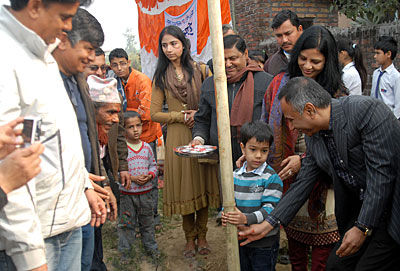 RAJESH GURUNG |
Bias is built into the very concept of news. No report of an event, or the background and circumstances of its occurrence, can ever be fully free of the attitudes and beliefs of the person doing the reporting. In fact, propaganda is such an essential element of the media that most of us in the profession find it unnecessary to explain that our values get reflected in whatever we do.
The degree of predisposition may vary, but few journalists can honestly claim that they are completely objective. Even in straight reporting of facts, the slant of a reporter or news editor is reflected in the phrasing of headlines, the angle of photographs, the wording of captions or placement on the page.
Political wrangling is page one because most journalists in Nepal consider it to be urgent enough to bring it to national attention. Events of economic and cultural significance go to the tail end of a news broadcast or to the inner pages of the papers, even though they may be more urgent or important.
Ravindra Mishra is a professional journalist for the BBC Nepali Service but a media activist of some repute who unabashedly promotes causes close to his heart. But once in a while, he doesn't hesitate to censure even widely celebrated authors, like the author of the Nepali bestseller Soch, Karna Shakya. However, when that controversy appeared to be careening out of control, he publicly apologised.
Recently, Mishra has taken up the cause of Samata Shiksha Niketan and its promoter Uttam Sanjel. In a country where philanthropy is rare, Sanjel's efforts to provide affordable education to the poor are indeed admirable. Upendra Mahato, a Nepali billionaire who made his fortune in the independent republics of the former Soviet Union, believes Sanjel's experiments in affordable private education need a bigger laboratory. He has thus decided to sponsor the construction of a string of these schools all over the country.
When Mahato travelled to lay foundation stones for Sanjel's schools, a herd of reporters from Kathmandu followed him wherever he went. Glowing accounts of his philanthropy then appeared in the press. Almost identical photographs of Mahato doing puja in a pit as his family looked on adoringly were published in the dailies. The media willingly became a propaganda tool for what it had decided was a worthwhile cause
Seemingly dispassionate, neutral and objective reporting is the most effective publicity vehicle. Perhaps that could be the reason politicians use suggestive tip-offs to get desired coverage. Businesses exploit inauguration or anniversary ceremonies for business purposes. Social entrepreneurs rely on friendly journalists to push their reformist agenda.
All these techniques are variations of 'embedded journalism': seemingly objective dispatches by reporters receiving hospitality and other facilities from organisers.
Somehow, the media reports about the extension of Sanjel's schools in the countryside gave the impression that its financial sponsor was more important than the idea or the person behind it. This may have had unintended
consequences for the credibility of reporters practicing junket journalism. We are all propagandists, but we need to be mindful of the principles and personalities we promote.



